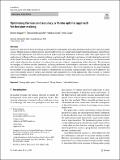Optimizing fairness and accuracy: a Pareto optimal approach for decision-making
Author(s)
Nagpal, Rashmi; Shahsavarifar, Rasoul; Goyal, Vaibhav; Gupta, Amar
Download43681_2024_Article_508.pdf (1.429Mb)
Publisher with Creative Commons License
Publisher with Creative Commons License
Creative Commons Attribution
Additional downloads
Publisher with Creative Commons License
Publisher with Creative Commons License
Creative Commons Attribution
Terms of use
Metadata
Show full item recordAbstract
In the era of data-driven decision-making, ensuring fairness and equality in machine learning models has become increasingly crucial. Multiple fairness definitions have been brought forward to evaluate and mitigate unintended fairness-related harms in real-world applications, with little research on addressing their interactions with each other. This paper explores the application of a Minimax Pareto-optimized solution to optimize individual and group fairness at individual and group levels on the Adult Census Income dataset as well as on the German Credit dataset. The objective of training a classification model with a multi-objective loss function is to achieve fair outcomes without compromising utility objectives. We investigate the interplay of different fairness definitions, including definitions of performance consistency and traditional group and individual fairness measures, amongst each other coupled with performance. The results presented in this paper highlight the feasibility of incorporating several fairness considerations into machine learning models, which can be applied to use cases with multiple sensitive features and attributes that characterize real-world applications. This research is a valuable step toward building responsible and transparent machine learning systems that can be incorporated into critical decision-making processes.
Date issued
2024-07-18Department
Massachusetts Institute of Technology. Computer Science and Artificial Intelligence LaboratoryJournal
AI and Ethics
Publisher
Springer Science and Business Media LLC
Citation
Nagpal, R., Shahsavarifar, R., Goyal, V. et al. Optimizing fairness and accuracy: a Pareto optimal approach for decision-making. AI Ethics (2024).
Version: Final published version
ISSN
2730-5953
2730-5961